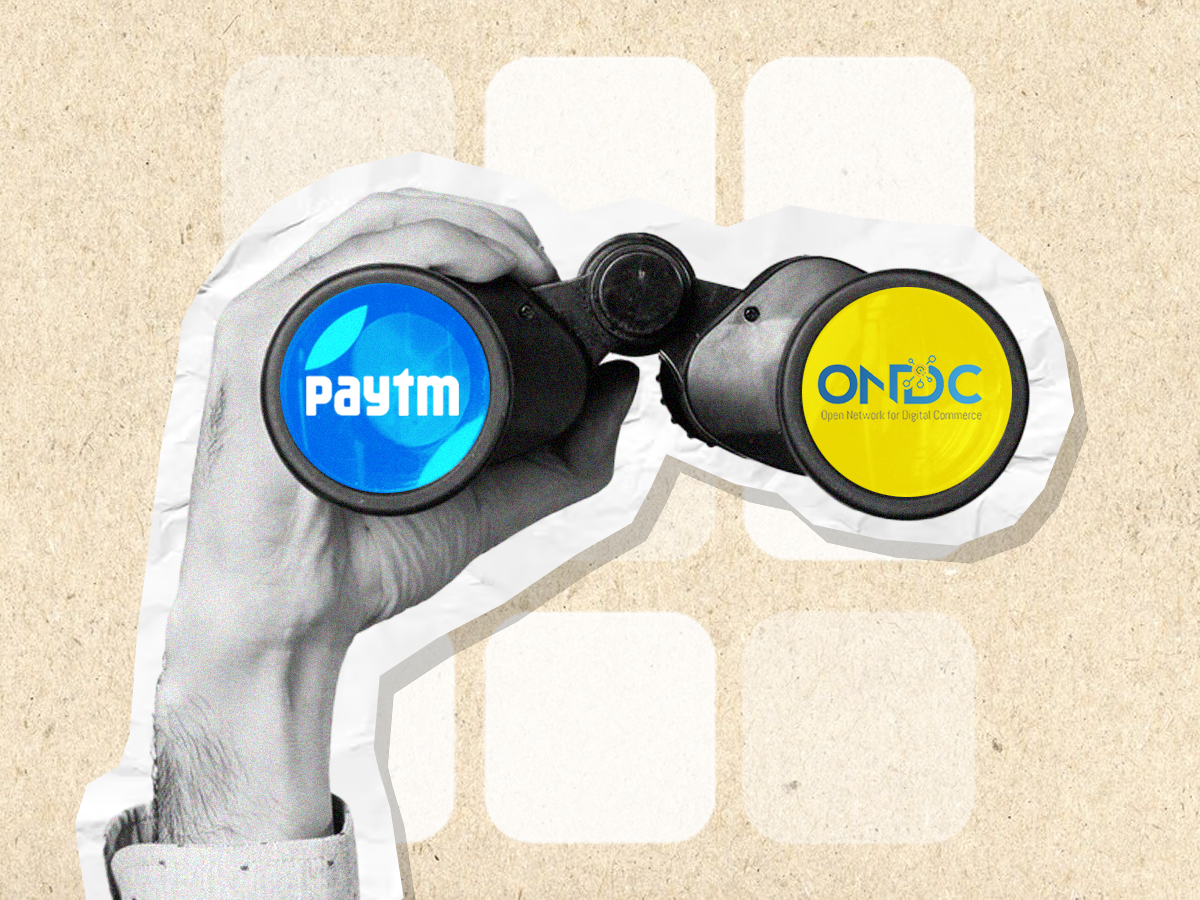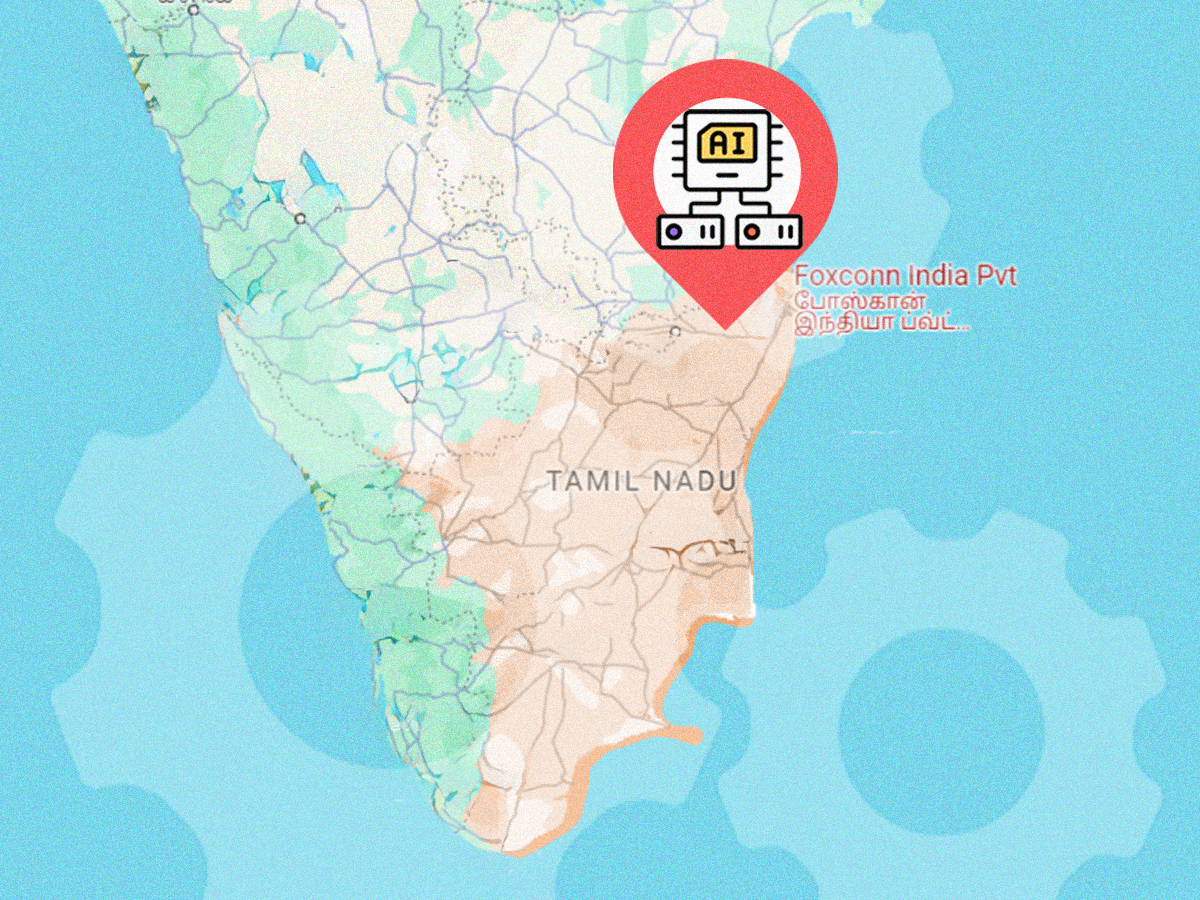Business News›Tech›Newsletters›Morning Dispatch›Wary Paytm to avoid regulated biz; Foxconn to make AI servers in India
 Morning Dispatch Morning Dispatch |
Wary Paytm to avoid regulated biz; Foxconn to make AI servers in India
Want this newsletter delivered to your inbox?
I agree to receive newsletters and marketing communications via e-mail

Thank you for subscribing to Morning Dispatch
We'll soon meet in your inbox.
Happy Friday! Paytm is steering clear of regulated businesses and will instead focus on building a strong distribution network, insiders say. This and more in today's ETtech Morning Dispatch.
Also in the letter:
■ Synopsys CEO interview
■ Why illegal betting thrives in India
■ Urban Company financial update

Digital payments major Paytm wants to stay away from getting into any regulated businesses and would rather focus on building distribution heft, two people in the know told us. The senior leadership, including the founder and the chief financial officer, have taken a conscious call to not go after regulatory licenses but rather work with licenced entities and distribute products better.
Background: This development follows the fintech major suffering a major regulatory setback earlier this year in its payments bank business. So, changing its tack from going after the banking licence to a payments licence to an insurance licence, the leadership now wants to be a distribution-led platform. Paytm will work with banks, NBFCs, and insurance companies to distribute their products and generate revenue from commissions.
Also read | How banks are cornering market share from Paytm Bank’s Fastag business
Quote, unquote: During the analyst meet after the March quarterly results, Paytm CFO Madhur Deora said that the company's focus has shifted to the distribution-led model for personal loans where lenders are responsible for collections.
Responding to our queries a Paytm spokesperson denied any change in business strategy. “There is no change in our business strategy. We continue to focus on our regulated payments and financial services business,” the spokesperson said.
Impact on business: At a time when many fintechs want to secure a licence to gain more validity in the eyes of the regulator, Paytm’s stance is interesting because it will help the company focus on what it does best—build distribution and set up last mile services. Paytm has almost one crore merchants and eight crore users who know the brand and use it regularly. By offering them products and services, Paytm will generate commission revenue, and it expects the take rate to settle at around 3- 3.5%.
Also read | Paytm Payments Bank’s wallet business fading fast as restrictions bite

Contract manufacturer Foxconn said it has plans to begin manufacturing AI servers—the high-performance computing engines that train and run artificial intelligence (AI) models—at its Indian facilities, sources told us.
Details: Foxconn is likely to use its existing facilities in Tamil Nadu to build the servers.
This move will be an expansion for the company, which is best known as the lead assembler of the Apple iPhone. Analysts say this is the company’s natural next step and aligns with its broader strategy to diversify beyond phones.
Chairman Young Liu had said at a company shareholders’ meet last month that AI servers will “soon become Foxconn's next-trillion-dollar revenue product”.
Foxconn’s India play: Foxconn is aggressively pushing investments into India. Most recently, it was reported that Google is in advanced talks with Foxconn to locally make Pixel smartphones in Tamil Nadu. In February, Foxconn had said its Indian subsidiary would spend Rs 1,200 crore to build a factory on company-owned land. It is also building a mega factory outside Bengaluru, which is expected to primarily make iPhones.
High stakes: Industry experts said that India expects its share in the global market for AI servers to increase to 40% this year, up from 30% last year. It is also likely that electric vehicle (EV) components and servers are Foxconn’s next bet in India, as these products offer better margins compared to the assembly of mobile phones.
 Sassine Ghazi, CEO, Synopsys
Sassine Ghazi, CEO, Synopsys
US-based chip design company Synopsys will help Tata Electronics in multiple aspects of its fab facility—India’s first—coming up in Gujarat and its assembly and testing unit in Assam, chief executive Sassine Ghazi told us.
Driving the news: Ghazi said Synopsys will ramp up the designing of custom semiconductor products for Tata Electronics and help in factory automation, data analytics, computer-aided design, and supply product design kits. It will also help develop intellectual property (IP) for chip fabrication.
Tata Electronics plans to build India’s first fab factory in Dholera, Gujarat, at an investment of $11 billion. Another Rs 27,000 crore will be invested in a greenfield facility at Jagiroad, Assam for the assembly and testing of semiconductor chips.
Takes a village: “They (Tatas) are bringing the technology from a partner. We’re going to be working with them to tune it, bring it to their expectations of yield, power, and performance, and to bring their customers in,” he said.
Ghazi said a company can build the most sophisticated manufacturing facility, but if you don’t have enablement for IP and know-how of the rules around design, the manufacturing part may not be very useful.

The illegal betting market, already thriving in India, is expected to grow by 30% in the coming years, as per a new study.
Breaking down the numbers: According to Delhi-based policy think tank Centre for Knowledge Sovereignty (CKS), despite regulatory restrictions, India’s illegal betting market receives an estimated $100 billion per annum in deposits.
Independent statistics suggest that this market grew at a 7% CAGR from 2012 to 2018 and is expected to grow at an annual rate of 30% in the coming years.
What’s driving it? Inadequate legal frameworks, selective banning, and high taxation on legitimate online gaming platforms seem to be key factors contributing to this trend.
Vinit Goenka, founder secretary, CKS, said that illegal operators are taking advantage of the new tax regime, which levies a 28% tax on deposits on legal gaming platforms.
 Abhiraj Singh Bhal, CEO, Urban Company
Abhiraj Singh Bhal, CEO, Urban Company
‘Urban Company makes Rs 282-283 crore revenue, pre-tax profit in Q1’: Gurugram-based home services platform Urban Company recorded Rs 282-283 crore in revenue so far for the April-June period this year, with the quarter logging a profit before tax (PBT), cofounder and chief executive Abhiraj Singh Bhal said Thursday.
London PE Finnest takes majority stake in cloud kitchen firm Kitchens@: London-based private equity firm Finnest has bought a majority stake in cloud kitchens-focused startup Kitchens@ by investing Rs 1,335 crore ($160 million) in the company, per regulatory filings and people in the know.
Amazon tops up India payments business with Rs 600 crore: US ecommerce giant Amazon made a fresh capital infusion of Rs 600 crore (about $72 million) in Amazon Pay India, bolstering the Indian fintech arm’s efforts to intensify competition with Paytm, PhonePe, and Google Pay.
■ Trump–Biden debate conspiracies have already flooded the internet (Wired)
■ Microsoft Bing’s censorship in China is even “more extreme” than Chinese companies’ (Rest of World)
■ Wanted: AI prompt engineer for the in-house legal team (FT)
Also in the letter:
■ Synopsys CEO interview
■ Why illegal betting thrives in India
■ Urban Company financial update
No more licensed biz, Paytm to focus on distribution model

Digital payments major Paytm wants to stay away from getting into any regulated businesses and would rather focus on building distribution heft, two people in the know told us. The senior leadership, including the founder and the chief financial officer, have taken a conscious call to not go after regulatory licenses but rather work with licenced entities and distribute products better.
Background: This development follows the fintech major suffering a major regulatory setback earlier this year in its payments bank business. So, changing its tack from going after the banking licence to a payments licence to an insurance licence, the leadership now wants to be a distribution-led platform. Paytm will work with banks, NBFCs, and insurance companies to distribute their products and generate revenue from commissions.
Also read | How banks are cornering market share from Paytm Bank’s Fastag business
Quote, unquote: During the analyst meet after the March quarterly results, Paytm CFO Madhur Deora said that the company's focus has shifted to the distribution-led model for personal loans where lenders are responsible for collections.
Responding to our queries a Paytm spokesperson denied any change in business strategy. “There is no change in our business strategy. We continue to focus on our regulated payments and financial services business,” the spokesperson said.
Impact on business: At a time when many fintechs want to secure a licence to gain more validity in the eyes of the regulator, Paytm’s stance is interesting because it will help the company focus on what it does best—build distribution and set up last mile services. Paytm has almost one crore merchants and eight crore users who know the brand and use it regularly. By offering them products and services, Paytm will generate commission revenue, and it expects the take rate to settle at around 3- 3.5%.
Also read | Paytm Payments Bank’s wallet business fading fast as restrictions bite
After iPhone, Foxconn’s next big revenue project in India is AI servers

Contract manufacturer Foxconn said it has plans to begin manufacturing AI servers—the high-performance computing engines that train and run artificial intelligence (AI) models—at its Indian facilities, sources told us.
Details: Foxconn is likely to use its existing facilities in Tamil Nadu to build the servers.
This move will be an expansion for the company, which is best known as the lead assembler of the Apple iPhone. Analysts say this is the company’s natural next step and aligns with its broader strategy to diversify beyond phones.
Chairman Young Liu had said at a company shareholders’ meet last month that AI servers will “soon become Foxconn's next-trillion-dollar revenue product”.
Foxconn’s India play: Foxconn is aggressively pushing investments into India. Most recently, it was reported that Google is in advanced talks with Foxconn to locally make Pixel smartphones in Tamil Nadu. In February, Foxconn had said its Indian subsidiary would spend Rs 1,200 crore to build a factory on company-owned land. It is also building a mega factory outside Bengaluru, which is expected to primarily make iPhones.
High stakes: Industry experts said that India expects its share in the global market for AI servers to increase to 40% this year, up from 30% last year. It is also likely that electric vehicle (EV) components and servers are Foxconn’s next bet in India, as these products offer better margins compared to the assembly of mobile phones.
Synopsys will help Tata Electronics design custom chips

US-based chip design company Synopsys will help Tata Electronics in multiple aspects of its fab facility—India’s first—coming up in Gujarat and its assembly and testing unit in Assam, chief executive Sassine Ghazi told us.
Driving the news: Ghazi said Synopsys will ramp up the designing of custom semiconductor products for Tata Electronics and help in factory automation, data analytics, computer-aided design, and supply product design kits. It will also help develop intellectual property (IP) for chip fabrication.
Tata Electronics plans to build India’s first fab factory in Dholera, Gujarat, at an investment of $11 billion. Another Rs 27,000 crore will be invested in a greenfield facility at Jagiroad, Assam for the assembly and testing of semiconductor chips.
Takes a village: “They (Tatas) are bringing the technology from a partner. We’re going to be working with them to tune it, bring it to their expectations of yield, power, and performance, and to bring their customers in,” he said.
Ghazi said a company can build the most sophisticated manufacturing facility, but if you don’t have enablement for IP and know-how of the rules around design, the manufacturing part may not be very useful.
Illegal betting market to grow by 30% in the coming years, says study

The illegal betting market, already thriving in India, is expected to grow by 30% in the coming years, as per a new study.
Breaking down the numbers: According to Delhi-based policy think tank Centre for Knowledge Sovereignty (CKS), despite regulatory restrictions, India’s illegal betting market receives an estimated $100 billion per annum in deposits.
Independent statistics suggest that this market grew at a 7% CAGR from 2012 to 2018 and is expected to grow at an annual rate of 30% in the coming years.
What’s driving it? Inadequate legal frameworks, selective banning, and high taxation on legitimate online gaming platforms seem to be key factors contributing to this trend.
Vinit Goenka, founder secretary, CKS, said that illegal operators are taking advantage of the new tax regime, which levies a 28% tax on deposits on legal gaming platforms.
Other Top Stories By Our Reporters

‘Urban Company makes Rs 282-283 crore revenue, pre-tax profit in Q1’: Gurugram-based home services platform Urban Company recorded Rs 282-283 crore in revenue so far for the April-June period this year, with the quarter logging a profit before tax (PBT), cofounder and chief executive Abhiraj Singh Bhal said Thursday.
London PE Finnest takes majority stake in cloud kitchen firm Kitchens@: London-based private equity firm Finnest has bought a majority stake in cloud kitchens-focused startup Kitchens@ by investing Rs 1,335 crore ($160 million) in the company, per regulatory filings and people in the know.
Amazon tops up India payments business with Rs 600 crore: US ecommerce giant Amazon made a fresh capital infusion of Rs 600 crore (about $72 million) in Amazon Pay India, bolstering the Indian fintech arm’s efforts to intensify competition with Paytm, PhonePe, and Google Pay.
Global Picks We Are Reading
■ Trump–Biden debate conspiracies have already flooded the internet (Wired)
■ Microsoft Bing’s censorship in China is even “more extreme” than Chinese companies’ (Rest of World)
■ Wanted: AI prompt engineer for the in-house legal team (FT)
Want this newsletter delivered to your inbox?
I agree to receive newsletters and marketing communications via e-mail

Thank you for subscribing to Morning Dispatch
We'll soon meet in your inbox.
